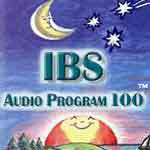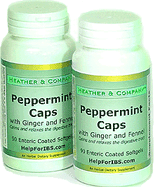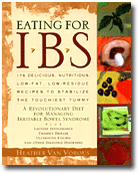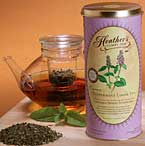| |
 |

Organic Acacia
Soluble Fiber
The prebiotic fiber that reduces bloating & gas!

In this Issue...
Food & Recipes
Special Events
Rx News & Research
Ask Heather ~ GERD & IBS
About Us

Gut-directed hypnosis is one of the most effective ways to help relieve all IBS symptoms! Results can last more than 5 years.


Fennel Tummy Tea for
IBS Bloating & Gas
Fennel has anti-spasmodic properties and it stimulates the production of gastric juices. Fennel tea is the best for relieving bloating and gas!
Did you miss the latest
IBS newsletter and
Mushroom Crab Omelet?
Past issues
are posted here!

Try Peppermint Caps
Peppermint Caps are the best for abdominal spasms, cramps and pain!

Delicious Recipes
for IBS!
Learn how to eat well and feel better

The IBS Starter Kit!
Learn every way possible to successfully manage your symptoms!
With the First Year: IBS, an essential guide, plus Eating for IBS, plus Acacia Tummy Fiber to start stabilizing immediately!

Try Heather's
Peppermint Tummy Tea
Peppermint is a smooth muscle relaxant and has pain-killing properties. Our tea is large leaf with a high volatile oil content - much stronger than tea bags!
|
 |
|
| |

Did your email mangle this newsletter? Copy and paste this address into your browser window:
http://www.helpforibs.com/news/newsletter/breadsal091404.html or click here to see it online.
September 15, 2004
This week - Acid Reflux, Hearburn, Gerd & the IBS Diet!
Hello to everyone -
If you've got a garden full of ripe tomatoes you need to use before autumn sets in, here's the perfect recipe - a traditional Italian bread salad. This is a simple, rustic, delicious, and IBS-safe one-dish meal. Bread salad is a great way to use fresh veggies and herbs with a soluble fiber foundation, and best of all it tastes fabulous!
We're entering the final countdown for the IBS Vegas Fall Sprawl, so now's the time to make your plans to attend what is sure to be a terrific and truly unique event. Plus, as always, we have a wealth of new digestive health research findings. Enjoy!
Best Wishes,
Heather Van Vorous
Did a friend send you this newsletter? Sign up here for your own free subscription.

Italian Tomato Bread Salad
Makes 3-4 Servings
Dressing:
1 tablespoon extra virgin olive oil
3 tablespoons white or red wine vinegar
1 tablespoon balsamic vinegar
1 small garlic clove, minced to a paste with a dash of salt
Salt and white pepper to taste
Salad:
3 cups stale crusty French or Italian bread, cut into 1/2" dice
1/2 lb. fresh ripe tomatoes, diced
1 small cucumber, peeled, seeded, and diced
1 cup thinly sliced sweet white onions (such as Maui or Walla Walla)
1/2 cup packed basil leaves, stems removed, finely shredded
Whisk together all dressing ingredients and set aside. Combine all salad ingredients in a large bowl and toss gently. Drizzle with dressing and toss to coat.
For oodles of other delicious recipes, come visit the IBS Recipe Exchange board!
Are you just learning how to eat for IBS? A little intimidated at the thought of special IBS recipes? Not quite sure just what makes these recipes special in the first place? Don't worry! Come see
the IBS Diet pages, and find the answers to all your questions.
 Help Pass the Michigan Bathroom Bill!
Help Pass the Michigan Bathroom Bill!
Jill Sklar, the terrific moderator of our Crohn's and Colitis Message Board, is the force behind a truly wonderful piece of legislation that is currently before the Michigan legislature. This bill, if it becomes law, will make it illegal for any Michigan business that is open to the public to deny private or "employee only" bathrooms to those who need it due to a medical condition (such as IBS or IBD). You can read the full Senate version of the bill here (the House version is the same and was introduced a week earlier). The bill is currently before the House Judiciary Committee, awaiting a hearing date. Jill needs all Michiganians to please, please write a letter to Judiciary Chairman and State Representative Jim Howell and request a hearing on the matter. The address is:
N1198 House Office Building
P.O. Box 30014
Lansing, MI 48909-7514
If the Michigan bill passes, it could become the template for similar laws in all 50 states. Please write to Jill at jillsklar@comcast.net if you have any questions, and thanks for your support!
 Diagnostic Approach to Suspected Irritable Bowel Syndrome
Diagnostic Approach to Suspected Irritable Bowel Syndrome
Diagnostic activity in patients with suspected irritable bowel syndrome (IBS) should be brief and focused, limited to investigations that are likely to exclude serious alternative diagnoses and when negative support a positive diagnosis of IBS. The diagnosis of IBS is clinical, and is robust over time, although other symptoms may add to the clinical picture and other symptoms of functional disorders are common. The most important differential diagnoses are celiac disease, colorectal carcinoma and colitis. 'Red Flag' symptoms and signs should be considered indications for full colonoscopy, which should be performed with a low threshold in patients above 50 years of age. Serologic markers are useful to exclude celiac disease, but positive tests must be confirmed with duodenal biopsies.
Check here for more
information...
Gastrointestinal Motility Disturbances in Celiac Disease
It is quite frequent to recognize celiac patients who show gastrointestinal motor abnormalities in clinical practice. In fact, in 30 to 60% of patients, physical examination and dyspeptic symptoms (epigastric discomfort, early satiety) suggest a gastrointestinal motility disorder. Consistent data are now available on the presence of a disturbed motility of the esophagus, stomach, small intestine, gallbladder, and colon of untreated celiac patients. Whatever the initial event in the pathogenesis of the celiac lesions may be, we know for certain at this time that gastrointestinal disturbances play an important role in the genesis of gastrointestinal symptoms in celiac disease and that surveillance for celiac disease in patients complaining of dysmotility-like dyspeptic symptoms should be increased.
Check here for more
information...
Dyssynergic Defecation
To understand the nature of bowel disturbance in patients with dyssynergia (chronic constipation due to a failure of coordination between the pelvic floor muscles and the anal sphincter, characterized by difficulty or inability to expel stool from the anorectum), we prospectively examined demographics, stool patterns, and quality of life by administering a 31-item questionnaire to 120 patients who fulfilled symptomatic and manometric criteria for dyssynergia.
Check here for more
information...
Autonomic Cardiovascular Responses Impaired in Women With IBS
Goals: This study characterizes cardiovascular autonomic function in women with irritable bowel syndrome (IBS), using standardized techniques.
Background: Autonomic dysfunction is believed to contribute to abnormal gastrointestinal motility and visceral hypersensitivity in IBS. There is mounting evidence of generalized impairment of autonomic activity in patients with IBS.
Conclusions: Autonomic cardiovascular function is impaired in IBS, manifest as attenuated cardio-vagal tone, and relative sympathetic excess during stimulated conditions.
Check here for more
information...
Alterations of the Digestive Tract in the Pathophysiology of IBS
Pathophysiology of irritable bowel syndrome (IBS) is based upon multiple factors that have been organised in a comprehensive model centred around the brain-gut axis. The brain-gut axis encompasses nerve pathways linking the enteric and the central nervous systems and contains a large proportion of afferent fibres. Functionally and anatomically, visceral nerves are divided in to two categories: the parasympathetic pathways distributing to the upper gut through the vagi and to the hindgut, through the pelvic and pudendal nerves, and the sympathetic pathways, arising form the spinal cord and distributing to the midgut via the paravertebral ganglia.
Several abnormalities of gut sensori-motor function have been described in patients with IBS. Abnormal motility patterns have been described at the intestinal and colonic levels. Changes in colonic motility are mainly related to bowel disturbances linked to IBS but do not correlate with pain. More recently, visceral hypersensitivity has been recognised as a main characteristic of patients with IBS. It is defined by an exaggerated perception of luminal distension of various segments of the gut and related to peripheral changes in the processing of visceral sensations as well as modulation of perception by centrally acting factors including mood and stress.
Viscero-visceral reflexes link the two edges of the brain-gut axis and may account for the origin of symptoms in some pathological conditions. Recent advances in the understanding of the role of myenteric plexus allowed recognition of several neurotransmitters involved at the level of both the afferent and efferent pathways. Targeting the receptors of these neurotransmitters is a promising way for development of new treatments for IBS.
Check here for more
information...
Looking for the latest IBS research and news?
Check out the IBS Research Library!
 A Diet for IBS and GERD?
A Diet for IBS and GERD?
"I have acid reflux and IBS as well. Can I follow the IBS diet or will this make my heartburn worse?"
People with Irritable Bowel Syndrome are statistically more likely to have upper GI problems (like GERD or reflux) as well. The good news is that the vast majority of dietary changes that help IBS will also help prevent or minimize heartburn - there are just a few special considerations you'll need to take.
The general IBS diet guidelines of low fat, high soluble fiber, and the careful addition of insoluble fiber, are well-suited to reflux as well. In particular, going low fat will be very beneficial for IBS and reflux both, so make sure you're avoiding the high fat trigger foods. While acidic foods can sometimes (but not always) bother IBS, they are very hard on reflux, so be careful with citrus, vinegars, and cooked tomatoes.
Coffee is an acidic food that is also a powerful GI tract irritant and it will wreak havoc on both your lower and upper digestive tract - please avoid it completely (even decaf!) Tea is not a safe replacement beverage, however; both black and green teas contain caffeine (problematic for IBS) and tannins (not good for reflux). Carbonated drinks and chewing gum increase the amount of swallowed air in your GI tract, and are also bad news for reflux and IBS both.
Herbal teas are an excellent option instead, with one big exception: peppermint, which is one of the single best herbs for IBS (particularly pain and cramping), is such a powerful smooth muscle relaxant (which is why it helps IBS) that it can seriously exacerbate heartburn. Choose fennel, chamomile, or anise teas instead. You may also be able to use peppermint in the form of enteric coated peppermint oil capsules, which do not dissolve in the stomach. Instead, they pass through the digestive tract intact until they reach the intestines, so they are often very helpful for people with both reflux and IBS who cannot tolerate peppermint in other forms (such as teas or candies). If you do have reflux and want to try peppermint oil capsules, it's usually best to take each capsule on an empty stomach, about one hour before a meal. The "no alcohol, no tobacco" rule for IBS also applies to reflux, so if you have both digestive problems it's time to change any hard-partying ways (sorry).
Sulfur-containing vegetables (garlic, onions, leeks, broccoli, cauliflower, cabbage, asparagus, and Brussels sprouts), can produce significant gas in the GI tract and this can trigger IBS attacks, and the sulfur can also exacerbate reflux. As with all other fruits and veggies, however, these are extremely nutritious foods with significant health benefits, so they need to be treated with caution but, if at all possible, not simply eliminated from your diet.
Chocolate, in the form of unsweetened cocoa powder used for baking, is usually very tolerable for IBS (both the fat and caffeine have been removed). Unfortunately, chocolate in any form can worsen reflux, so you may well have to forego this particular treat altogether. Why the discrepancy? Chocolate contains theobromine (a compound that's also found in tea and coffee), which relaxes the esophageal sphincter muscle (just like peppermint), and triggers reflux. So chocolate, like peppermint, is one of the few foods that can be perfectly safe for lower, but not upper, GI problems. Other foods in this category are hot peppers, which contain capsicain. While they can be tolerated, especially in smaller amounts, by some folks with IBS, the capsicain can dramatically trigger reflux and you'll probably want to avoid hot peppers (such as jalapenos, habaneros, cayenne, etc.) altogether. This does NOT mean you have to avoid all herbs and spices - to the contrary, most are actually digestive aids, and it's only the capsicain family you need to avoid. There's no need to stick to bland foods unless you actually want to!
Some other general guidelines that are helpful for IBS are equally beneficial for reflux, particularly eating small meals frequently and taking soluble fiber supplements. Keeping your GI tract filled with soluble fiber throughout the day will make a world of difference in helping your digestion (both upper and lower) stay stable. When it comes to your soluble fiber supplement, be extra careful to avoid citric acid, which makes many "orange" flavored supplements taste, well, orange. Citric acid is, rather obviously, acidic, and this can make a soluble fiber supplement highly problematic instead of helpful for your digestion. Choose a plain, unflavored soluble fiber supplement like Tummy Fiber Acacia instead of a citric acid variety, and you'll get all the benefits without any risk.
One of the most popular previous IBS Newsletter columns was the Seven Sneaky Deadly Sins of the IBS Diet. Wondering what they all are? Check here...
1. Coffee (yes, decaf counts)
2. Yogurt (it's the safest dairy product for IBS...isn't it?)
3. Alcohol (just one glass of wine is okay, right?)
4. Vitamin supplements (they're good for you, aren't they?)
5. No insoluble fiber foods (they're triggers, so you just don't eat them, right?)
6. Too low a dosage of soluble fiber supplements
7. Not drinking enough water (doesn't soda pop count?)
 Heather & Company for IBS, LLC is dedicated to serving people with Irritable Bowel Syndrome. Our mission is to provide education, support, and products that allow people with IBS to successfully manage their symptoms through lifestyle modifications.
Heather & Company for IBS, LLC is dedicated to serving people with Irritable Bowel Syndrome. Our mission is to provide education, support, and products that allow people with IBS to successfully manage their symptoms through lifestyle modifications.
We offer extensive information and tangible help for IBS, including the world's best-selling and best-reviewed books for the disorder. We provide the internet's top IBS web site resources; a twice-monthly IBS Newsletter; seminars and classes; dietary brochures for patient distribution by health care professionals; an IBS Research Library; and Heather Cooks!, a healthy cooking show on Seattle television. Much of our work is based on Heather's development of the first and only comprehensive IBS dietary guidelines and recipes, an achievement which has earned numerous awards and accolades as well as thousands of thank you letters from IBS sufferers.
Heather & Company also provides the only patient-expert moderated IBS Message Boards on the internet with forums for diet, recipes, hypnotherapy, yoga, plus Crohn's and Colitis. In addition, we support and coordinate the formation and continuation of local in-person IBS support groups across the USA, Canada, the UK, Australia, and New Zealand. We will soon have other IBS services and products available.
Our website receives over 2.5 million visits each year, and our newsletter is sent to over 25,000 people. We are regular exhibitors at the Digestive Disease Week and American Dietetic Association conferences.
Sponsorship opportunities are available for the message boards and this newsletter for companies and/or products that have been legitimately established as helpful for digestive disorders.
Please contact us for information.

You are receiving this email because you have expressed interest in IBS news and information.
To unsubscribe from Heather's IBS Newsletter, click here http://www.helpforibs.com/news/unsub.asp or send an email to help@helpforibs.com.
Change your newsletter email address here.
If you are viewing this newsletter on a website and would like to subscribe for email delivery, please "Join the IBS Newsletter" here.
ANTI-SPAM PRIVACY POLICY
LEGAL DISCLAIMER - This email is not intended to replace the services of a physician, nor does it constitute a doctor-patient relationship. Any application of the recommendations in this email is at the reader's discretion. Heather Van Vorous and Heather & Company for IBS, LLC are not liable for any direct or indirect claim, loss or damage resulting from use of this email and/or any web site(s) linked to/from it. Readers should consult their own physicians concerning the recommendations in this email.
HelpForIBS.com
Heather & Company for IBS, LLC
80 S. Washington St, #304
Seattle, WA 98104 USA
© 2004 Heather & Company for IBS, LLC. All rights reserved.
|
|
|
|